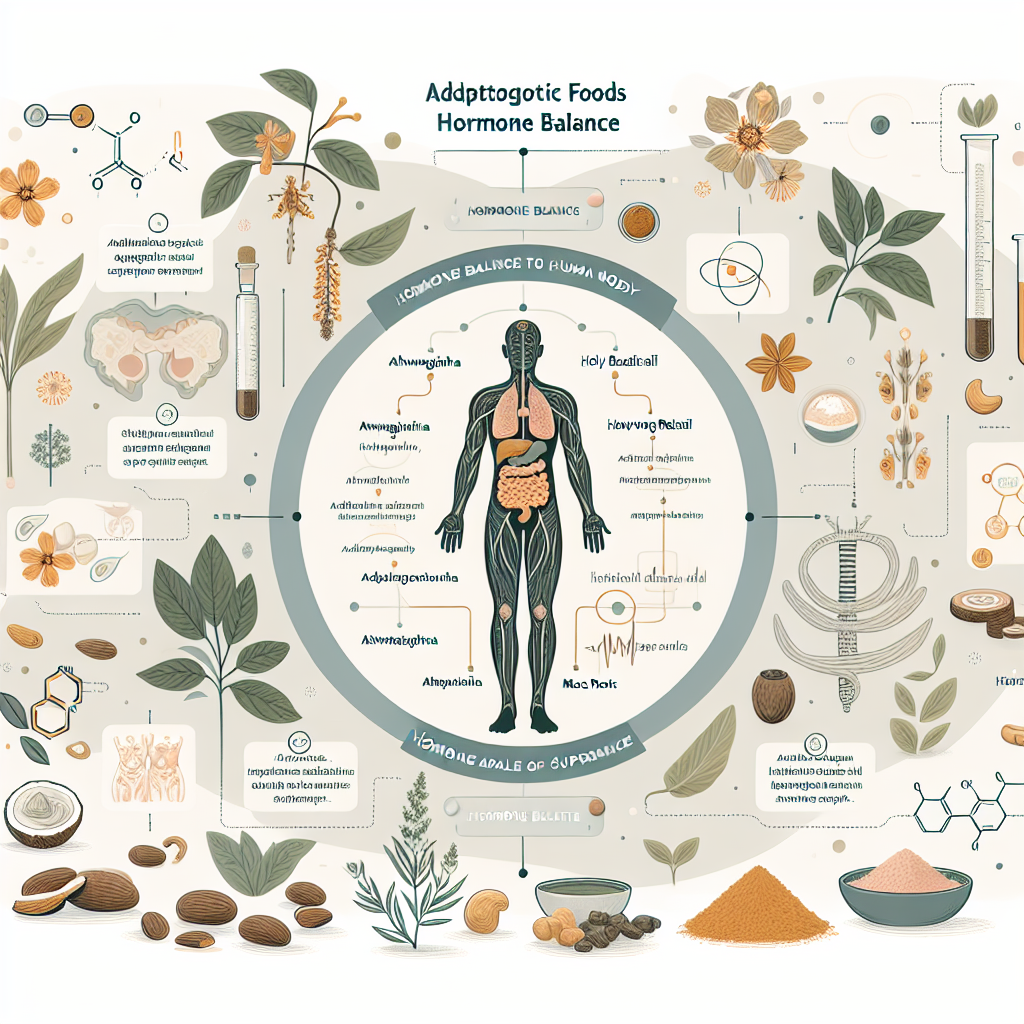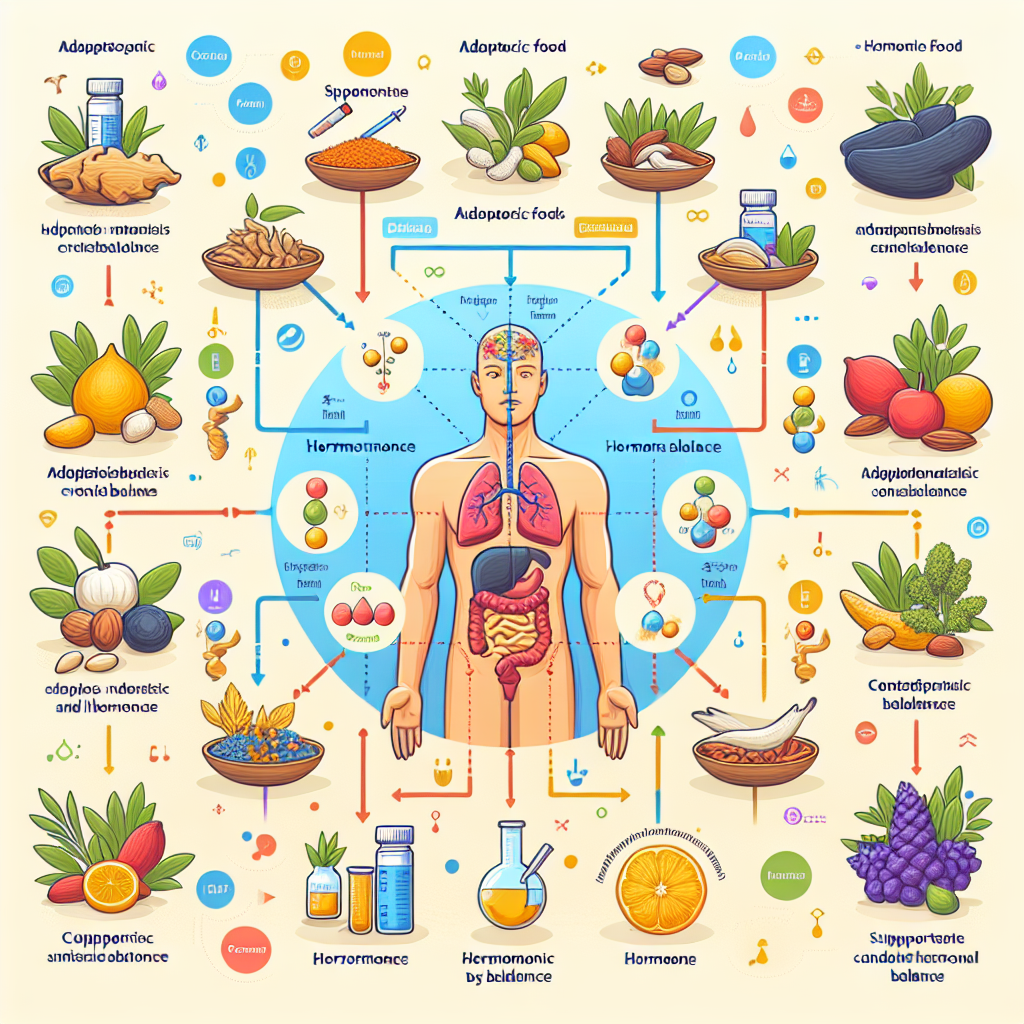How Adaptogenic Foods Support Hormone Balance

Discover how Adaptogenic Foods can support your hormone balance! Learn more about their benefits and how to incorporate them into your diet for a healthier lifestyle. Visit My Vibrant Vitality now!
Exploring the Role of Adaptogenic Foods in Hormone Regulation
Adaptogenic foods, a term that has gained significant traction in the health and wellness industry, are renowned for their ability to help the body adapt to stress and promote overall well-being. These foods, which include herbs and mushrooms, have been used for centuries in traditional medicine for their healing properties. Recently, they have been recognized for their potential role in hormone regulation, a critical aspect of maintaining optimal health.
Hormones, the body’s chemical messengers, play a crucial role in regulating various physiological processes, including metabolism, growth and development, tissue function, and mood. An imbalance in hormone levels can lead to a myriad of health issues, such as weight gain, mood swings, fatigue, and even chronic conditions like diabetes and heart disease. Therefore, maintaining hormonal balance is of utmost importance.
Adaptogenic foods come into play here. They are believed to support the body’s endocrine system, which is responsible for hormone production and regulation. These foods contain certain compounds that interact with the body’s stress response system, helping to modulate the production of stress hormones like cortisol. By doing so, they can help the body maintain a state of balance, even in the face of stress.
For instance, ashwagandha, a well-known adaptogen, has been shown in studies to reduce cortisol levels, thereby helping to alleviate stress and anxiety. Similarly, maca, another adaptogen, is believed to support the endocrine system and help balance hormones related to reproductive health. It has been used traditionally to enhance fertility and alleviate symptoms of menopause.
Moreover, adaptogenic foods are also thought to support thyroid function, which is crucial for hormone regulation. The thyroid gland produces hormones that regulate metabolism, and an underactive or overactive thyroid can lead to hormonal imbalances. Certain adaptogens, like ashwagandha and holy basil, have been found to support thyroid health, potentially helping to regulate hormone levels.
In addition to their potential role in hormone regulation, adaptogenic foods are also rich in antioxidants, which can help protect the body from oxidative stress. Oxidative stress can lead to inflammation, which in turn can disrupt hormone balance. By helping to reduce oxidative stress, adaptogens may further support hormone regulation.
However, while the potential benefits of adaptogenic foods are promising, it’s important to note that they are not a cure-all. Hormone regulation is a complex process that can be influenced by a variety of factors, including diet, exercise, sleep, and stress levels. Therefore, while adaptogenic foods can certainly play a role in supporting hormone balance, they should be used as part of a holistic approach to health and wellness.
Furthermore, it’s also crucial to consult with a healthcare provider before starting any new health regimen, including the use of adaptogens. While these foods are generally considered safe, they can interact with certain medications and may not be suitable for everyone.
In conclusion, adaptogenic foods, with their potential to support the endocrine system and help the body adapt to stress, offer a promising avenue for supporting hormone balance. By incorporating these foods into a balanced diet and maintaining a healthy lifestyle, individuals may be able to promote overall well-being and potentially prevent the health issues associated with hormonal imbalances.
The Impact of Adaptogenic Foods on Hormone Balance

Adaptogenic foods, a term that has been gaining traction in the health and wellness industry, are natural substances that help the body adapt to stress and promote normal physiological functions. These foods are known for their ability to support hormone balance, a critical aspect of overall health and well-being. Hormones, the body’s chemical messengers, play a crucial role in regulating various bodily functions, including metabolism, growth and development, sexual function, reproduction, and mood. When our hormones are out of balance, it can lead to a host of health issues, from fatigue and weight gain to mood swings and decreased sexual function.
Adaptogenic foods, such as ashwagandha, ginseng, and holy basil, among others, have been used for centuries in traditional medicine to help the body maintain a healthy balance of hormones. These foods contain unique compounds that interact with the endocrine system, the body’s network of glands that produce hormones, to support optimal hormone production and regulation.
Ashwagandha, for instance, is a powerful adaptogen that has been shown to support the adrenal glands, which produce hormones that help the body respond to stress. By supporting adrenal health, ashwagandha can help maintain a healthy balance of cortisol, the body’s primary stress hormone. Too much cortisol can lead to a host of health issues, including weight gain, fatigue, and mood swings. By helping to regulate cortisol levels, ashwagandha can support overall hormone balance and promote better health and well-being.
Similarly, ginseng, another well-known adaptogen, has been shown to support hormone balance by interacting with the hypothalamic-pituitary-adrenal (HPA) axis, a complex network of interactions among the hypothalamus, the pituitary gland, and the adrenal glands. The HPA axis plays a crucial role in regulating the body’s response to stress and maintaining overall hormone balance. Ginseng’s ability to support the HPA axis can help maintain a healthy balance of stress hormones and promote overall hormone balance.
Holy basil, also known as tulsi, is another powerful adaptogen that has been shown to support hormone balance. Holy basil has been used for centuries in Ayurvedic medicine to help the body adapt to stress and promote overall health and well-being. Research has shown that holy basil can help regulate cortisol levels, support thyroid function, and promote a healthy balance of hormones.
In conclusion, adaptogenic foods can play a crucial role in supporting hormone balance. By interacting with the endocrine system and supporting the body’s response to stress, these foods can help maintain a healthy balance of hormones and promote overall health and well-being. However, it’s important to remember that while adaptogenic foods can support hormone balance, they are not a substitute for a healthy diet and lifestyle. Regular exercise, a balanced diet, adequate sleep, and stress management are all crucial for maintaining hormone balance and overall health. As always, it’s important to consult with a healthcare provider before starting any new dietary or supplement regimen.
Understanding How Adaptogenic Foods Promote Hormonal Equilibrium
Adaptogenic foods, a term that has been gaining traction in the health and wellness industry, are natural substances that help the body adapt to stress and promote hormonal equilibrium. These foods, which include herbs and mushrooms, have been used for centuries in traditional medicine to enhance the body’s resilience to physical, chemical, and biological stressors. They are now being recognized for their potential to support hormone balance, a critical aspect of overall health and well-being.
Hormones, the body’s chemical messengers, play a crucial role in regulating various physiological processes, including metabolism, growth and development, tissue function, sleep, and mood. When our hormones are out of balance, it can lead to a host of health issues, ranging from fatigue and weight gain to more serious conditions like diabetes and heart disease. Therefore, maintaining hormonal balance is essential for optimal health.
Adaptogenic foods work by interacting with the hypothalamic-pituitary-adrenal (HPA) axis, the body’s central stress response system. When we encounter stress, the HPA axis triggers the release of cortisol, the primary stress hormone. While cortisol is necessary for survival, chronic stress can lead to persistently high levels of cortisol, disrupting the balance of other hormones and leading to health problems. Adaptogens help to modulate the body’s stress response, reducing the production of cortisol and promoting hormonal balance.
For instance, the adaptogenic herb Ashwagandha has been shown to reduce cortisol levels and improve stress-related outcomes. Similarly, Rhodiola Rosea, another adaptogen, has been found to enhance the body’s resistance to stress, thereby helping to maintain hormonal balance. These adaptogens, along with others like Holy Basil and Ginseng, work by supporting the adrenal glands, which produce cortisol and other hormones.
In addition to modulating the stress response, adaptogenic foods also support hormone balance by promoting healthy liver function. The liver plays a crucial role in hormone metabolism, breaking down excess hormones and removing them from the body. By supporting liver health, adaptogens help to ensure that hormones are metabolized and excreted efficiently, preventing hormonal imbalances.
Furthermore, adaptogenic foods can also support hormone balance by promoting healthy gut function. The gut microbiome, the community of microorganisms living in our intestines, plays a significant role in hormone regulation. Certain adaptogens, such as Reishi mushrooms, have been found to promote a healthy gut microbiome, thereby supporting hormone balance.
In conclusion, adaptogenic foods offer a natural and holistic approach to maintaining hormonal balance. By modulating the body’s stress response, supporting liver and gut health, and promoting the efficient metabolism and excretion of hormones, these foods can help to prevent hormonal imbalances and promote overall health and well-being. However, it’s important to remember that while adaptogenic foods can support hormone balance, they are not a substitute for a healthy lifestyle. Regular exercise, a balanced diet, adequate sleep, and stress management are all crucial for maintaining hormonal balance and overall health. Therefore, adaptogenic foods should be incorporated into a holistic approach to health and wellness, rather than being relied upon as a standalone solution.